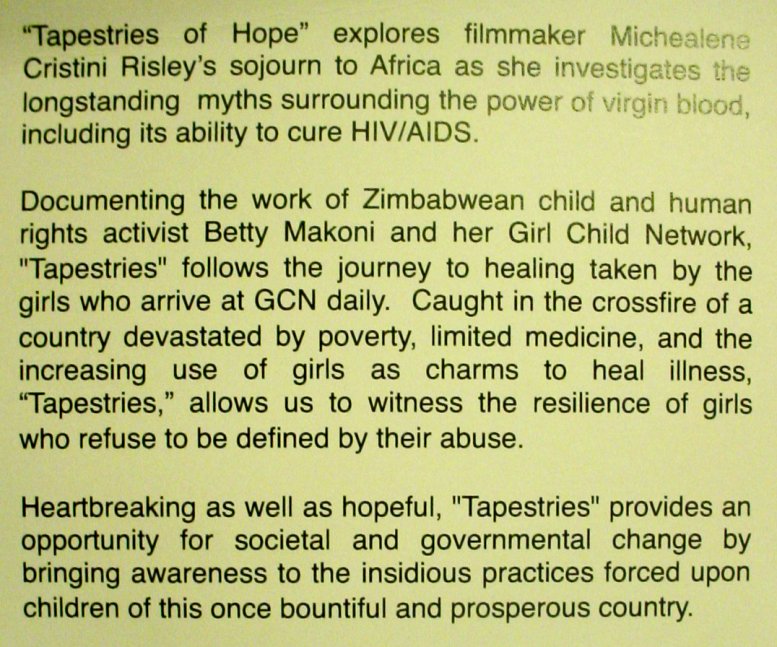I heard
about this movie from Sally Lieber's email list. She was telling us
about some sort of
premiere. I went to it and found out the film maker (Michealene
Cristini Risley) and the star
(Betty Makoni) were both there for it. Not only that, but Amnesty
International leadership
was also there, along with somebody important from the website where
the film maker had learned about Makoni and her work, www.thewip.net. Most of the rather
small crowd was very well dressed and genteel. It wasn't long after I
got there that the movie quickly got to the point about the problem
they wanted us to know about.
The
essence of it all is that shamans have been spreading the story that
having sex with a young woman cures HIV and AIDS. There are many
desperate men who don't want to die, and they have been trying the
idea. Girls who have had the experience are getting the "damaged goods"
treatment, making them effectively orphans. Betty Makoni has feelers
out for such girls, and she tries to help them as soon as possible
after the event. When they come in she sits with them, listens to their
stories and cleans them up as much as possible. Then she works to get
them educated and empowered, making them assets to their community.
Supposedly,
if she can get them cleaned up within 72 hours of the rape AIDS can be
prevented. Unfortunately, that is often not possible. A lot of the film
was brief stories of girls who were there when Risley and her crew
visited. One or two of them did go on to college, but many died of
AIDS. The
most galling case was a girl that died of AIDS at only eight months of
age. It was clear that Betty Makoni did have a good strategy for
healing the women's psyche, because many of the girls were able to
smile for the camera despite what they had been through.
They
also had footage of a guy with an advanced case of AIDS who told his
story. He said the healer had told him a young womans sex could solve
his AIDS problem. He tried it and it didn't work. Not only that, but
now he had the knowledge that he had killed someone else with his AIDS
to carry around. It was clear that knowledge bothered him. He also died
before the movie ended. Dying of AIDS in Zimbabwe doesn't take that
long, and happens a lot.
Q&A with the audience followed the film.
Nobody
wanted to go first, so I went up and said "That was a very touching
movie. Maybe if you get guys like
the one who said raping youngsters doesn't work to tell their stories
widely so more other guys get it from a guy that knows the truth the
rapes will
stop." Betty Makoni said something like "I agree with the comment, we
are going to try that."
When
the movie was made Betty Makoni only had one crisis center/girls
school, but since then she has franchised the model to a place in (I
think she said Botswana). She explained that she picked that place
because they had the same problems and it was convienient to get to.
I'm not
sure what the question was that elicited this, but Betty Makoni said
that she had done something that had freed 50,000 women from rape
camps, but it had also made the political system in Zimbabwe furious
with her. She is now a penniless wanderer, trying to figure out how to
change things with just her words. She is hoping to build a global
movement out of it. Find out more at:
The
last question went to an Indian guy that said "In India there is
massive aborting of female fetuses because parents want boys. These
girls don't even get a chance to cry. You should do a film about that."
He finished by saying "this isn't just a problem of Zimbabwe, it's a
global problem. We are all affected by the abuse of women."
Tian
Harter

